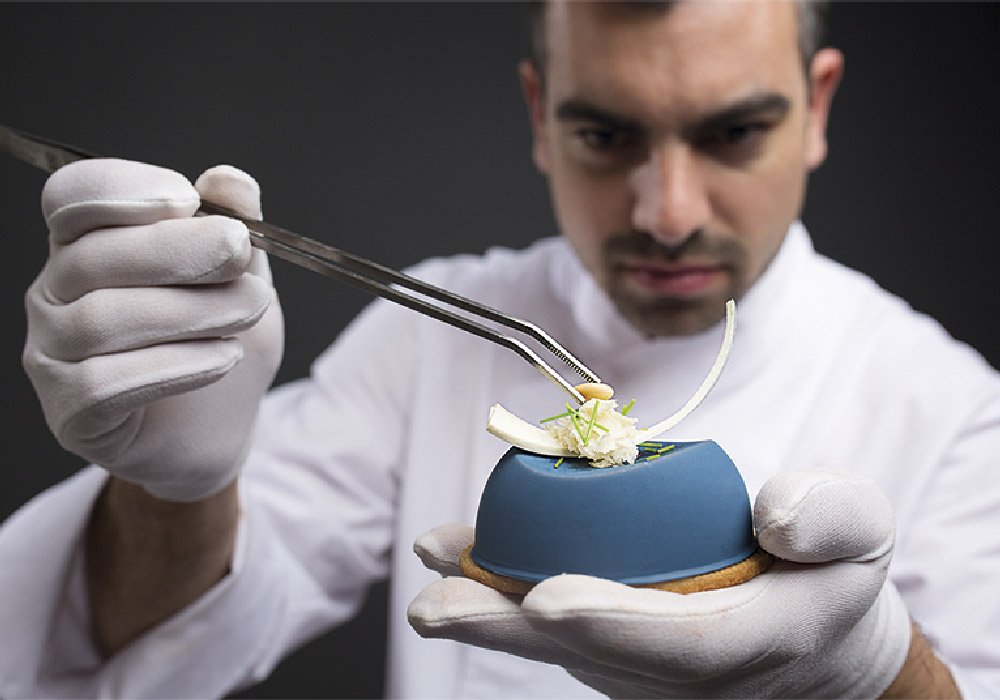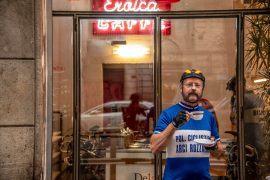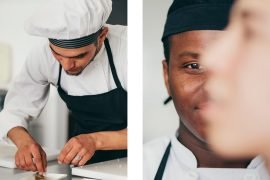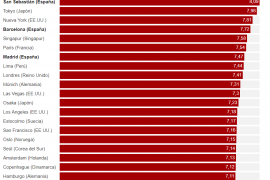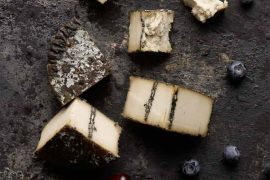[dropcap letter=”I”]
van Pascual has achieved a feat that many of us have dreamed of, when we were little: living surrounded by cakes. He grew “burning lionesas [typical pastry]” in his mother’s oven and has ended up becoming one of the best European chocolatiers. Ivan is an architect of sweet constructions who makes haute cuisine in small portions at Cal Gumer, the family business.
After a tough competition in Girona last October, he crowned himself as the best chocolatier master in Spain and, as a consequence, will compete against 20 more confectionary chefs from around the world for the title of World Chocolate Master, which will take place on the 31st of October to November 4th at the Salon du Chocolat in Paris.
Catalonia, and specifically Barcelona, has been and is the artistic chocolate capital. A city that can boast of being the birthplace of great masters such as Oriol Balaguer, Christian Escribà or Enric Rovira, who export their creations in the chicest shops in London, Tokyo, Paris or New York
 For this chocolate artist, born in Almenar 37 years ago, a small Lleida population of about 4,000 inhabitants, this was the first time he participated in a contest, which he managed to access thanks to his confidence and tenacity. Pascual is committed to creativity one hundred percent, with a dessert where the presentation and new creation techniques predominate, being chocolate the main ingredient. Without neglecting the traditional flavour, he always seeks a balance of flavours in his creations, which are true works of art of sweetness.
For this chocolate artist, born in Almenar 37 years ago, a small Lleida population of about 4,000 inhabitants, this was the first time he participated in a contest, which he managed to access thanks to his confidence and tenacity. Pascual is committed to creativity one hundred percent, with a dessert where the presentation and new creation techniques predominate, being chocolate the main ingredient. Without neglecting the traditional flavour, he always seeks a balance of flavours in his creations, which are true works of art of sweetness.
Catalonia, and specifically Barcelona, has been and is the artistic chocolate capital. A city that can boast of being the birthplace of great masters such as Oriol Balaguer, Christian Escribà or Enric Rovira, who export their creations in the chicest shops in London, Tokyo, Paris or New York. But, let us know the origins of this young master pastry chef, visiting him in his atelier at Almenar.
When you started, did you think you would reach this status? How has been the road?
Not at all! I did not expect to get where I am now! Fifteen years ago, I started seriously with the bakery business, but I remember that I was already burning lionesas [typical pastry] in my mother’s oven, because first you have to burn cakes to learn how to make them well. I think that if you want to evolve in any area, you need to absorb everything you can, at any occasion. I started looking at specialized magazines and watching programs on television. I recorded the recipes of Karlos Arguiñano every day! And when I was 16, I started as an apprentice in a bakery in Lleida, offering for free my work. The road has not been easy. I think I begun too young, since I would have liked to spend five or six years wandering around, doing stages in pastry shops in Europe, but I also wanted to have my own business. I was 24 years old when I decided to start my own workshop.
I see that you are one of those self-made people…
I have always been very self-taught, but after studying at the School of Cuisine in Lleida I continued to learn through workshops and courses, until now. We learned to cook all kinds of food, but I always opted for confectionary. And it is in this world where I believe that the revolution -that has taken place in the world of cooking- is still pending.
Is being a master chocolatier a way of life? I imagine that the team around you is also very important.
It seems that we are in the background, but I want to stand up for “confectionary chefs”, because I have colleagues who say they are dessert chefs, instead I claim that I love being a confectionary chef. I don’t like the word “master” either. “Long ago, there were teachers who had their disciples, but now the information runs so fast that it helps to put us all at the same level”. I consider that I am just a person who works well with chocolate. As for my team, it is vital, I would not have reached the final in Paris without it, we are 6 people who work concertedly, and the mutual trust makes us stronger.
Is it in your atelier where everything that has to do with your work and the preparation of the contest is ‘cooked’?
Of course, the thing is that I have to combine my daily confectionary work with the preparation of pieces for the international contest. In small workshops, confectionary chefs must wager on creativity and good products, and not that much about the price. Now we are working on making some cakes combining cocoa and products from Lleida, such as honey and fruit, which could be released next year. It is a short-term project that we will not reveal until after the grand finale of the Chocolate Masters, in October.
Do you have any reference in this world of confectionery?
At the media level, no. I am one of those who think that confectionary chefs who come out in the media are not necessarily the best. Professionals, in Catalonia, we have very good ones, such as Josep Maria Ribé, Miquel Guarro or Ramon Morató, who act as consultants worldwide. They were part of the jury in the Girona contest, in which I participated, and -as you can understand- I was totally thrilled. In Berlin [one of the obligatory stops before the World Chocolate Masters] we all went by plane together with those great professionals. This direct contact helps you on many levels and opens many doors.
How much does it cost to participate in the World Chocolate Masters?
Well, when we went to Girona, once the contest ended I realized that, in fact, we had spent 15,000 euros, that I gave out of my pocket. With the challenge of Paris in mind, we decided to look for sponsors because the cost can reach fivefold. That is why a communication team and a design team came to work with me. We have managed to get 13 companies to collaborate with us and with this we will be able to cover 60% of the cost of the contest.
By the way, what a world, the world of chocolate! Everyone thinks they know about it, but I believe that working with it must be more complicated than it seems.
Yes, it is true, I always find people who -talking about chocolate- says, I like the 90% one, and they think they know [he refers to chocolate that has 90% cocoa, being the rest made of other ingredients]. For me, having more pure cocoa does not mean that it is better. I prefer the 70%, since it is less bitter and allows you to extract more aromas. As for the production of chocolate at a professional level, machinery is needed. I have a header brand, that also sponsors me: Cacao Barri.
Do you think that the success of your creations lies more in the artistic component or in the flavour?
For me, the main thing is that it’s good, I prioritize the flavour. We first find the flavour that we like, and afterwards look for a design. Instagram does a lot of damage, because it emphasizes the looks with photographs of almost unreal cakes, made basically of bright sugar. I think that first you have to think about taste and from there you will make a suitable visual and aesthetic composition.
What is the factor that determines the transition from good to excellent?
According to me, the most important thing is restlessness. I have had interns who studied five years of confectionary and do not have the will to improve. On the other hand, there are younger people who are eager to learn and try new things without having too many studies. This also happens in competitions, because there are very good people who do not want to appear in the media and stay in the workshop without taking part.
Is there room for sweet food, in times of crisis like the ones we have experienced?
I think it’s fundamental. It already said by popular wisdom, that in difficult moments you should serve something sweet. And this is where we come in, with our know-how! I think there should always be room for optimism, laughter and sweet flavours in our lives.
Are you happy as a confectionary chef?
Very, very, very happy. I would not change it for anything in the world. It is very demanding, but luckily my family understands it and gets involved, which is the most important thing.

